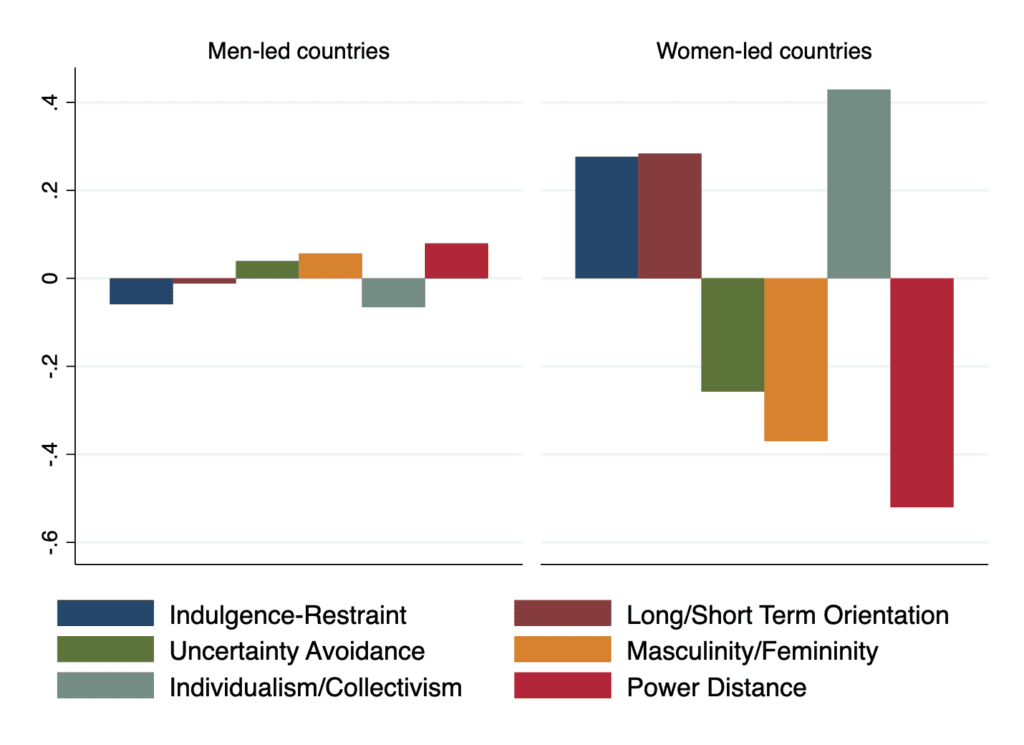This is a guest post from Courtney Burns and Leah Windsor. Burns is an Assistant Professor in the Department of Political Science at Bucknell University.
Windsor is a Research Assistant Professor in the Institute for Intelligent Systems and a Faculty Affiliate in the Department of Political Science at The University of Memphis. Follow her on Twitter @leahcwindsor.
Early in the Covid-19 pandemic, worldwide media heralded the leadership of women leaders like Jacinda Ardern and Erna Solberg for their ability to contain the spread of the virus, and the lethality within their countries’ borders. The common belief was that having a woman in charge was the key to reducing mortality from Covid-19.
This perception squares with pervasive gendered stereotypes about women being better caretakers and more compassionate – qualities that should be more important during a time when the world is sick, and quickly getting sicker. Yet this is not entirely the case.
We find that a country’s culture influences how many people within its borders die from Covid-19.
Leaders vs. Societies
As it turns out, both leaders and the societies they lead, determine the course of pandemics. What matters most is a country’s culture. We use Hofstede’s cultural dimensions data to contextualize the case and fatality rates in countries worldwide. Figure 1 shows the differences in culture in countries led by men and women. Countries with greater social equality and more tolerance for uncertainty have fewer Covid-19 deaths than do those that emphasize individual rights over the collective well-being of society more broadly.
Countries with more flexibility in gender roles – where it’s okay for both girls and boys to cry, and where both men and women can talk about facts and feelings – tend to do better. Countries that emphasize long-term goals over instant gratification also have fewer deaths.
Societies with these priorities who elect women also have fewer deaths per population. So both having a more egalitarian society **and** electing a woman leader has a statistically significant palliative effect on reducing the deaths from Covid-19.

Figure 1. Hofstede cultural dimensions in countries led by men and women
Our Bias is Showing
Overall, countries with women leaders have not had statistically fewer deaths from Covid-19 than countries led by men. At first glance, this seems to not bode well for the narrative and pervasive beliefs about women world leaders. However, in our recently-published article we find that the story is more complex – and more optimistic – than that.
Much of the narrative about the gendered advantage for women leaders comes from only looking at OECD countries; however, this is an incomplete picture of women leader responses. In our study, we examine the whole world – not just the richest countries. We also look at how countries have done as the pandemic deepened and worsened over time, accounting for the population size and longevity, and country attributes like geography, borders, and economy. All things equal, we find no statistically significant difference between how countries led by men or women have done during the pandemic.
Countries with women leaders who have done comparatively well during the pandemic – like New Zealand and Iceland – also have unique strategic, geographic advantages. They are remote island nations with small populations and borders that are easy to close. On the other hand, countries that have done well, like Vietnam – led by a man, with large populations (and who share a long border with China), but have failed to make the news.
The Gender Double Bind
Leaders like Ardern, Solberg, and Merkel have stood out in part because a global pandemic offers the opportunity for people to evaluate their leadership performance along familiar gendered categories. In many societies, women are expected to behave more feminine, and men more masculine. In politics, this is called the “double bind.”
Women are penalized for being too masculine, but also penalized for being too feminine. Women (leaders) who go against gender expectations are labeled aggressive or pushy. But those who adhere to gender expectations are labeled too nice or not taken seriously.
Crises like pandemics offer an opportunity for women world leaders to reconcile this double bind – they can be both decisive and strategic, as well as compassionate and nurturing.
This is what the world saw in March and April 2020 with countries like New Zealand closing borders and instituting strict lockdowns, and leaders like Norway’s Erna Solberg making a special appeal to children saying “it’s okay to feel scared.” Ardern gave speeches in casual clothing from home, visibly juggling her national and family responsibilities.
Moving forward
Changing the perception of wearing face masks – not as an infringement of individual liberty or personal choice, but as an outward demonstration of caring for our friends, neighbors, and strangers – from being an individual weakness to a societal strength can also help reduce the spread of Covid-19.
Measures such as temporary lockdowns and stay at home orders that inconvenience people in the short term can have tremendous benefits in the long term. The Covid-19 vaccine will help achieve herd immunity – but only if enough people get in line.
Social culture is hard to change, but leaders have a big influence on how citizens behave. Our research shows how cultural values that prioritize the well-being of everyone in society help reduce the spread and lethality of the Covid-19 virus – whether a man or woman is leading the country.


0 Comments